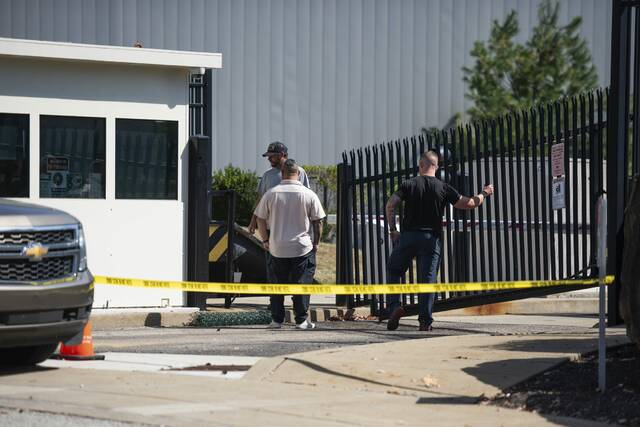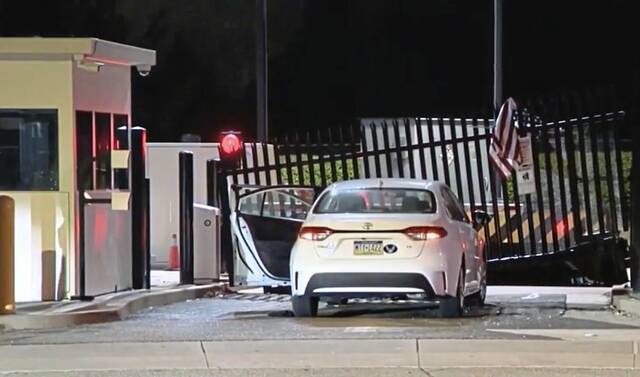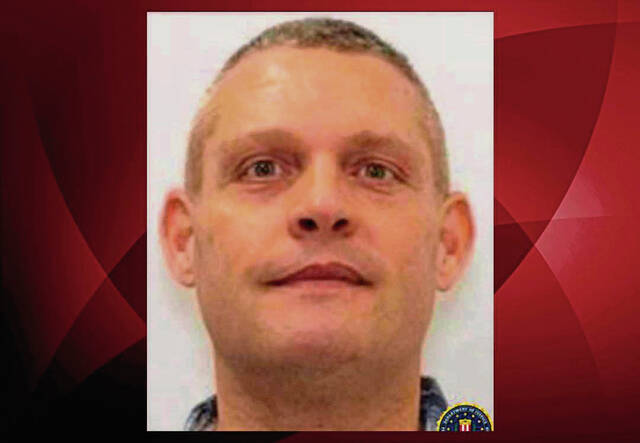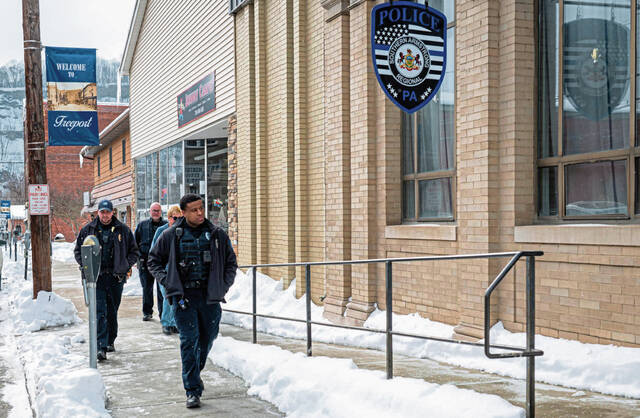A man accused of ramming his car into a security gate at the FBI’s Pittsburgh headquarters had a long history of mental illness, according to testimony Wednesday at a detention hearing in federal court.
Donald Henson had previously been involuntarily committed, spent six months in an intensive-inpatient treatment program through the VA and signed himself in for an additional week of treatment just this spring.
Still, when agents interviewed him on Sept. 17, hours after authorities said he crashed his car through the Sidney Street gate of the FBI building on the South Side, he told them he believed he had a monitoring device embedded in his throat, believed a man was living underneath his residence and that an entity was broadcasting thoughts to him through his vehicle.
On Wednesday, a federal judge granted the government’s motion to detain Henson pending trial.
“It is admirable to seek treatment,” said U.S. Magistrate Judge Kezia O.L. Taylor following the nearly two-hour hearing. “But given the amount of services you had, we still find ourselves here.”
Henson, 46, of Penn Hills, was charged on Sept. 17 with two felony counts — damaging government property and assaulting an officer — after investigators said he drove his white Toyota Corolla into a security gate.
Special Agent Bryon Speakes testified Wednesday that Henson made the turn into the driveway, did not slow down and steered into the lift gate around 2:40 a.m.
Henson then got out of his vehicle, retrieved an American flag — still on a pole — from his back seat and draped it over the fence before walking away.
“Initially, the guard thought there was a medical emergency that caused the collision,” Speakes said.
But the guard feared Henson was getting a gun when he walked to the back of his car. The guard remained inside the shack, the agent said, protected by bulletproof glass.
When Henson was arrested hours later, Speakes said, officers did not recover any weapons or explosives.
According to a criminal complaint, Henson stated “sic semper tyrannis,” a Latin phrase meaning “thus always to tyrants.”
What he intended, according to Assistant U.S. Attorney Nicole Vasquez Schmitt, was “to take back the power of the people.”
Rotting food
During his interview with FBI agents, Speakes said, Henson told them he had served in the U.S. Air Force and had PTSD.
He had been receiving mental health treatment from the VA for years.
Henson also said he was a recovering alcoholic and that he had used methamphetamine in the past, according to Speakes.
When agents searched Henson’s home, they found that his major appliances, including refrigerator and microwave, were unplugged and his food was rotting, Speakes said.
Agents also found a number of prescription bottles from the VA. It appeared as though the medication had not been taken, Speakes said.
As part of their investigation, agents spoke to Henson’s neighbor, who said she was alerted to motion outside her door 20 minutes before Henson rammed the gate.
She looked outside and saw Henson throw an American flag and flagpole on the driveway and watched him drive over it, Speakes said. Henson then left.
Prior visits to FBI
Before the ramming incident, Speakes testified, Henson had gone to the Pittsburgh FBI office twice seeking help. Henson believed his former roommate in Maryland was stealing his mail.
Speakes said the Pittsburgh FBI met with Henson and referred the matter to a Maryland office.
Henson also previously went to the Penn Hills police seeking assistance, Speakes said while being cross-examined.
“He mentioned to the agents he felt tormented, right?” defense attorney Linda E.J. Cohn asked.
“Yes,” Speakes answered.
“He didn’t once mention tyrants, did he?” she continued.
“No.”
Speakes said Henson told the agents interviewing him that he purposely veered away from the guard shack because he did not intend to hurt anyone.
“‘I made sure not to hit that booth,’” he said.
Flight risk
As part of the prosecution’s case, Vasquez Schmitt presented as exhibits several reports completed by the Pennsylvania State Police stemming from interactions they’d had with Henson in recent years.
In May 2023, Henson was charged with trespassing in Huntingdon County. He abandoned his car, took off his clothes and was found hiding in a brush pile, Vasquez Schmitt said.
Following that incident, she said, Henson was involuntarily committed for psychiatric treatment.
Carmen Denise Senft, who works for the Department of Veterans Affairs, testified about the services Henson has received over the years, including completing a six-month intensive inpatient program at the VA in Aspinwall in March.
Senft suggested that, if he were released, Henson could return to the long-term program at Aspinwall, where his medication could be managed property and he would be monitored 24 hours a day.
But Vasquez Schmitt argued to the court that the Aspinwall program is not a secure facility that could stop Henson from leaving.
“He went off his meds, he could certainly do it again,” she said. “He could walk away from this facility.”
While the prosecutor acknowledged Henson’s mental health needs, she also called him a danger and flight risk.
“This was a deliberate act … with a deadly weapon,” she said. “He did it as a statement to take back the rights of the people through any means necessary.
“What’s next, your honor? Ram a car through a crowd of people?”
Seeking help
Cohn argued that her client has no violent criminal history, and that, as a veteran with mental health issues stemming from his service, he deserves some leniency.
That service, she said, “should mean something.”
Cohn argued that there could be a combination of conditions that could ensure public safety — and that her client would show up for court.
“He’s somebody who wants help,” Cohn said. “He is not somebody who harms someone.”
She suggested that if Henson were released, the VA could alert investigators if he walked away, or that he could be monitored by GPS.
“The government has posed a lot of what-if questions,” Cohn said. “The reality is the court isn’t supposed to base things on fear. It’s supposed to base decisions on the evidence and the law.”
In making her decision, the judge said she was doing just that.
“The act to protect the people can’t be an act against the people or against the government.”
The judge thanked Henson for his service, prompting him to cry.
“What you did on behalf of your country means a lot.”













